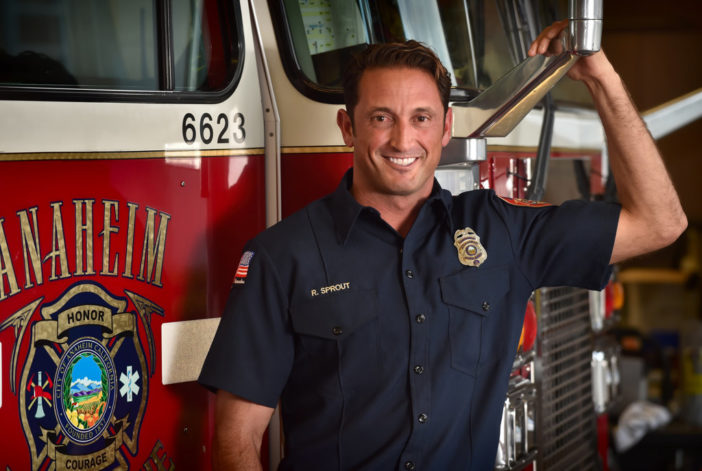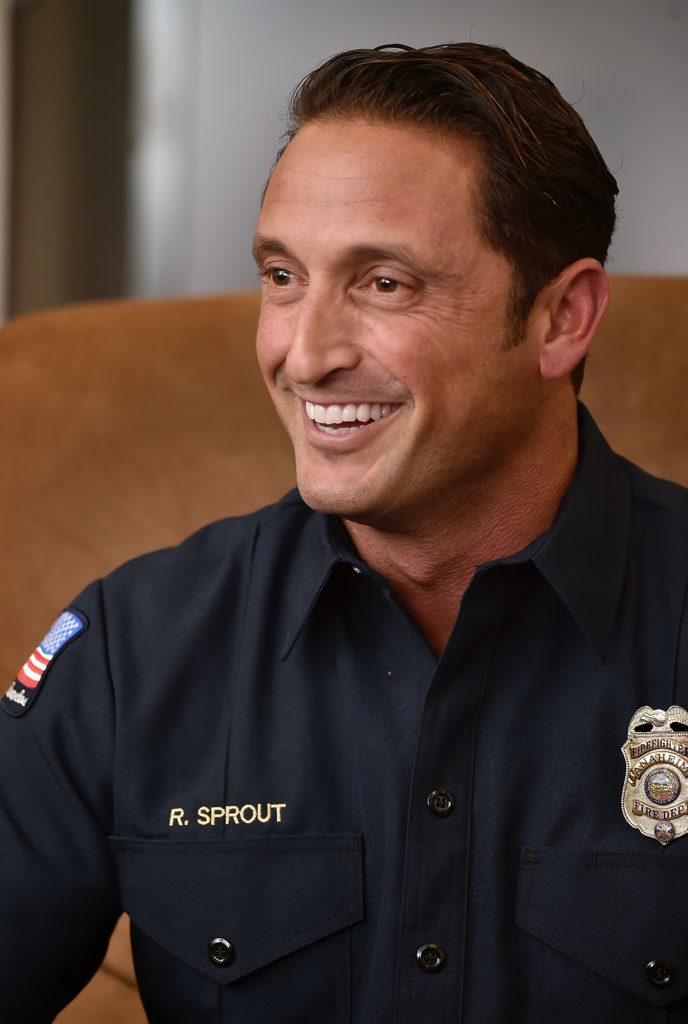How badly did he want to help people?
Growing up in coastal South Africa, Rich “Dickie” Sprout used the ocean as his personal gym, even though he couldn’t stand the feel of sand between his toes.
And that quirk didn’t prevent him from becoming an ocean lifeguard near his hometown of George, located in South Africa’s Western Cape.
“I have a burning need to help people,” says Sprout, who came to the U.S. with $500 in his pocket when he was 19 to pursue a career in lifeguarding/firefighting.
“If I can’t, I don’t feel whole.”
These days, as a firefighter with Anaheim Fire & Rescue, Sprout — who says he has “tactile sensitivity issues” — puts up with wearing a uniform. Outside of work, he practically lives in shorts and flip-flips, shirt optional.
But Sprout, 37, knows his uniform allows him to do the work he loves.
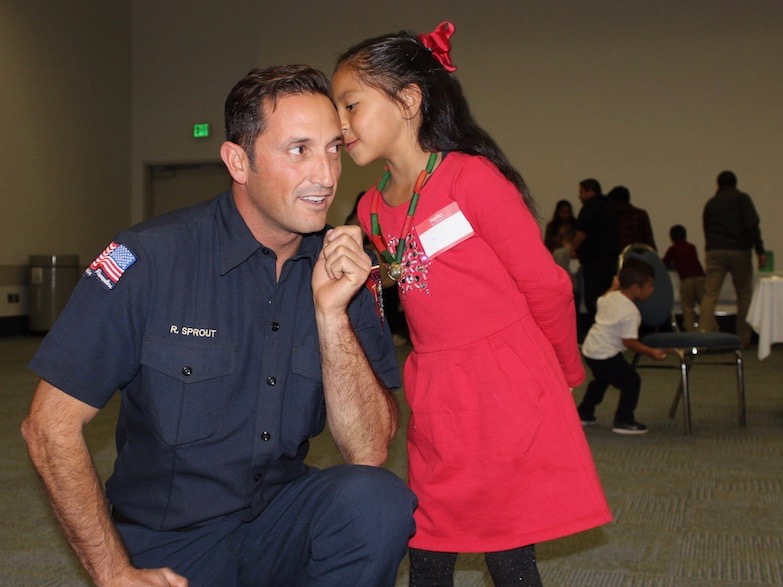
A girl who is a burn survivor tells Firefighter Rich Sprout what she wants for Christmas at a UCI Burn Center holiday party in 2017. Photo courtesy of AF&R
Sometimes, however, the people Sprout and his colleagues at Station 3 encounter on calls are beyond help.
“When I want to help someone and I get (to the scene of a call) and the person or persons is dead and there’s nothing I can do, I take it personally,” says Sprout.
In mid-December 2016, Sprout was on a crew that responded to a ghastly scene: an Infiniti police say was involved in street racing crashed into a home and burst into flames in the 1700 block of W. Ball Road.
Two men in the car were burned beyond recognition. A third passenger, helped out by a resident, was severely injured.
It was the latest in a rash of gruesome traffic collisions Sprout had responded to in the latter half of 2016.
He had seen a lot during his career at AF&R, which began in 2005.
But this call, Sprout couldn’t shake.
“I found myself cutting way too many broken bodies and burned bodies out of cars and picking up body parts,” Sprout says of late 2016. “And in this profession, you can’t un-see things. You can’t ‘un-smell’ burning flesh or ‘un-hear’ screams.”
When Sprout got back to the station after the Infiniti call, he vomited.
So did another firefighter.
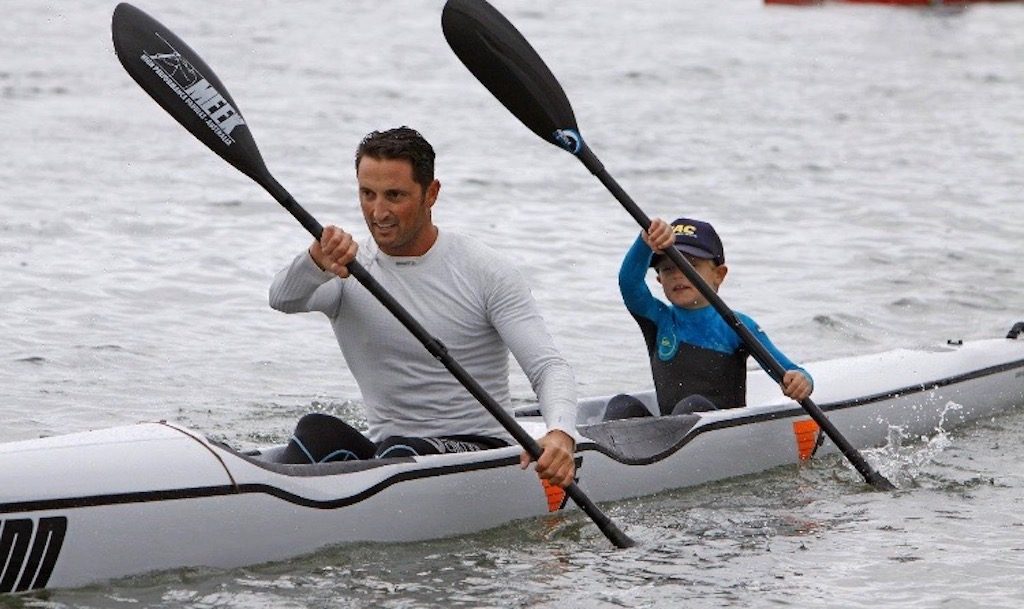
Rich Sprout with his son, Rhys, participating in a surfski race. “He’s quite the competitor,” Sprout says of his son. Photo courtesy of Rich Sprout
What might have been a fascinating call early in Sprout’s career now was horrifying.
The images of the carnage wouldn’t go away.
“It’s so easy to fix someone else,” Sprout said in a recent interview, his natural ebullience at times becoming muted.
“It’s very difficult to fix yourself.”
‘WHERE’S MY KAYAK?’
It was a classic prank to pull on a firehouse brother.
Sprout, who when he was 30 beat out more than 100 top paddlers from across the country and landed a spot on the USA kayaking team, kept a kayak rowing machine at work.
It sometimes would get in the way of other firefighters. One day, they hoisted it in the rafters of the apparatus bay (garage, for non-firefighters).
“Where’s my kayak?” bellowed Sprout, who maintains his South African accent.
After letting Sprout stew for a while, the firefighters pointed it out to him and finally brought the rower down.
It’s what members of the fire service do: rib each other, but only because they love each other.
What they find tougher to do, typically, is to open up.
After the street-racing call, Sprout had nightmares and trouble sleeping. He was on edge at home, and not himself around his wife, Melissa, and their then 6-year-old son, Rhys.
Realizing the effects the call had had on Sprout and others who responded to the street-racing deaths, AF&R leaders scheduled a critical incident stress debriefing. Participants took turns going around the room talking.
Old-school firehouse culture dictated that firefighters suck things up and quietly go about their business.
Times have changed.
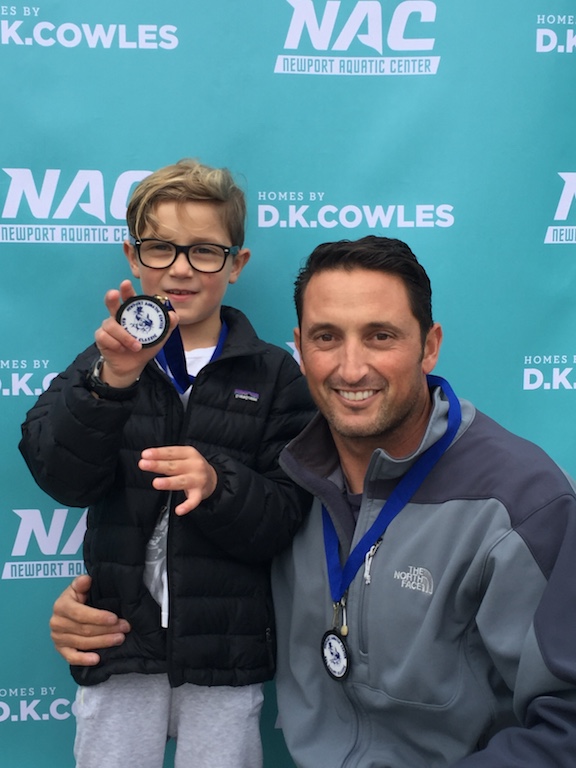
Rich Sprout with his son, Rhys, and the medals they won in a surfski race. Photo courtesy of Rich Sprout
Sprout opened up about his traumatic experience, which helped propel AF&R to bolster peer-support and related programs for personnel who are experiencing issues on the job or at home.
“It was rough for me,” Sprout said. “I was upset because I knew that wasn’t who I was, and I didn’t want to let anyone down. I was also worried about career consequences.”
AF&F leaders were very supportive of Sprout’s plight, and helped him get the help he needed.
He was put on administrative leave for a couple of days and began seeing a therapist.
“I needed the tools to learn how to deal with my stress,” Sprout said.
By March 2017, he felt better and ready to resume his firefighting duties.
“I put on my uniform and looked at myself in the mirror and something clicked,” Sprout said. “I said to myself, ‘You’ve still got it in you.’”
Sprout’s therapist, however, wouldn’t release him back to normal duties until May 2017.
Since then, he’s been fine.
“I know how to deal with it now,” Sprout says of job-related stress. “Before, I didn’t.”

Patrick (left) and his two daughters, 8 and 10, stand with Firefighter Rich Sprout (center) and his boss, Anaheim Fire & Rescue Capt. Tim Sandifer. Sprout met the family after a call. They had just
become homeless. “I did not want those poor little girls sleeping in a parking lot and not going to school,” Sprout says. “Patrick is a good guy and he loves his daughters but he didn’t have a job and he was unable to take care of them.” Sprout got his Station 3 colleagues to donate clothes, school supplies and toiletries, and they typed up a resume for Patrick and Sprout took him to job interviews while the girls were at school. “Eventually, I reached out to Councilman Jordan Brandman who helped me secure a hotel room for Patrick and the girls for a whole week,” Sprout says. “After countless hours at the DMV and social security office (he didn’t have an ID, social security card or bank account), I was able to help him get a job and a place to stay in Corona.” The girls are wearing helmets in the picture because they love skate boarding. The helmets are from AF&R’s “Wear Your Helmet Like a Pro” program. Says Sprout: “Patrick wanted to take a photo with us because he said nobody had ever been that kind to him, and he wanted the girls to remember.” Photo courtesy of Rich Sprout
THE KINDNESS OF OTHERS
A Station 3 colleague quips about fitness-fanatic Sprout: “He’s like a Ferrari, but he’s always in the shop. He’s a display model only.”
He wasn’t just referring to Sprout’s recent leave of absence.
In 2013, Sprout underwent near career-ending back surgery after suffering a herniated disc in his back after he helped move a 600-pound woman.
He was off the job for eight months. He used kayaking and swimming as a form of rehab.
Sprout lives with his wife and son in Newport Beach.
That’s where he landed, way back in 2000, after buying a one-way plane ticket to the U.S. He has dual citizenship since his mother is from Chicago.
Sprout came to the U.S. to pursue much-better career options.
“I had nothing to lose,” he said.
He recalled seeing the L.A. sprawl from the sky.
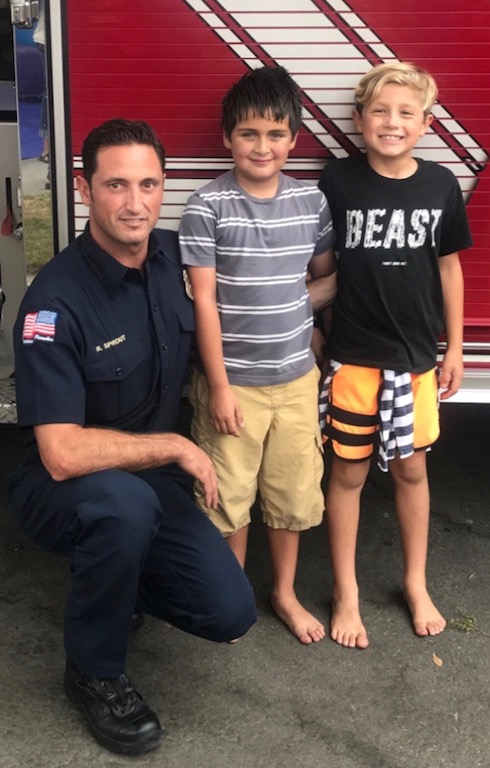
Firefighter Rich Sprout with his son, Rhys (right), and Jacob, who Sprout met on a call at Jacob’s home. His mother was deaf, had drug problems and an abusive boyfriend. “Jacob was filthy and covered in lice on the several occasions we went to his house,” Sprout says. “All he did was eat fast food and play video games while his mom got high and beaten. I worked very hard with social services to get him into a home, then foster care and then eventually he was adopted by a family in Oregon.” Jacob would sleep over at Sprout’s home on weekends wherever possible before he was adopted. Jacob and Rhys became great friends. “This photo was taken at his farewell party in Anaheim just before we left,” Sprout says. “I got permission to go to his foster home with the engine for the party. We all cried that day.” Photo courtesy of Rich Sprout
“It was the biggest thing I had ever seen. I thought to myself, ‘I’m not crawling home with my tail between my legs.’”
Sprout was down to $410 after taking a taxi from LAX to Newport Beach for a swim test for prospective lifeguards.
He made the cut, and was off to the races.
In those lean years, Sprout received a lot of help from others who let him stay in their homes and use their cars.
“I’ve been successful because of the help of good, kind people,” Sprout said. “This doesn’t happen where I come from. This is America.”
Sprout met his future wife, a hairstylist, in a Halloween store on Pacific Coast Highway when he was 21.
They married in 2005, when he was on his first-year probation as a new hire at AF&R.
Fourteen months ago, Sprout and his wife opened Kempt, a men’s-only hair salon in Irvine near John Wayne Airport. Among the employees at the salon is the daughter of recently retired AF&R Deputy Chief Jeff Alario.
Sprout sees similarities between the hair business and fire service.
“The fire service is synonymous with customer service, and running a hair salon is similar,” he said. “In both cases, I like to unexpectedly delight (customers and members of the public).”
Sprout knows his Station 3 colleagues have his back.
And he has theirs.
“We have people in the fire service — not just here, but the entire fire service — who need help,” Sprout said. “I’m glad there’s a system in place to help them. There’s been a cultural shift.”
 Behind the Badge
Behind the Badge
